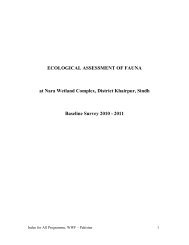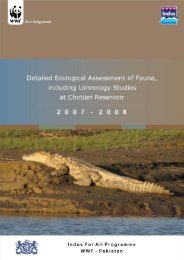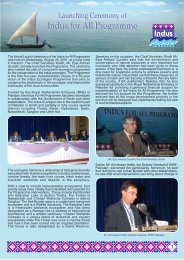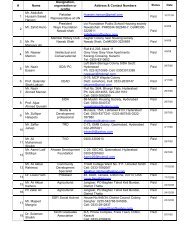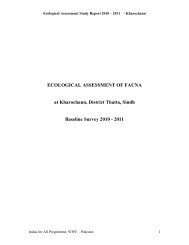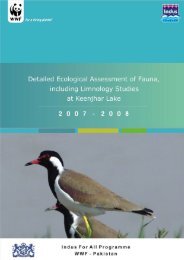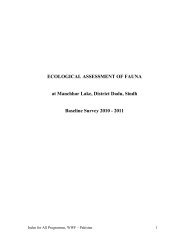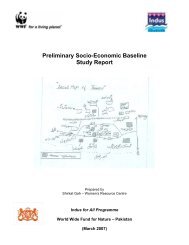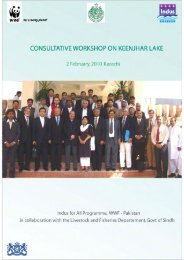Disclaimer note - WWF - Pakistan
Disclaimer note - WWF - Pakistan
Disclaimer note - WWF - Pakistan
Create successful ePaper yourself
Turn your PDF publications into a flip-book with our unique Google optimized e-Paper software.
Detailed Ecological Assessment Report 2008 – Keenjhar Lake<br />
4.1 Mammals<br />
4.1.1 Summary<br />
There is no significant difference in results of the summer and winter surveys of<br />
the study areas. The same 20 species were recorded from the study areas during<br />
both the surveys. However, during the winter survey, the population of Humpback<br />
dolphin was larger in different creeks at Keti Bunder. This is probably due to<br />
the availability of fish which they feed on. Moreover, most of the mammals<br />
particularly the nocturnal mammals were found more active during the summer<br />
survey and less active comparatively during the winter survey. The reasons seem<br />
to be the homoeothermy and the hibernation factors for less activeness of<br />
mammals during winter.<br />
The existence of Indian otter was doubtful in Chotiari Reservoir prior to these<br />
studies. During the present surveys both in summer and winter, the existence of<br />
this animal was confirmed in Chotiari Reservoir and Keti Shah and its population<br />
was estimated at both the sites.<br />
Estimated populations of mammals at different sites during two different surveys<br />
do not show any significant differences. For example, Hog deer population at Pai<br />
forest estimated during the summer survey was 18 animals whereas estimates<br />
during winter survey showed a population of 20 animals. During the summer<br />
survey 7 otters were estimated at Chotiari Reservoir but during winter survey<br />
about 12 animals were estimated. However, the locations where the otters were<br />
found during the summer survey were different from the locations during winter<br />
surveys. The locations along Nara canal where otters were found during summer<br />
survey showed no sign of otters during winter survey as the Nara canal was dry<br />
during winter survey. It shows that food availability, shelter and health of the<br />
habitat are the main factors.<br />
Local people as well as most of the conservationists believed that there exists the<br />
Asiatic wild ass in north eastern side of Chotiari. The present studies revealed<br />
that the existing population is apparently the feral donkeys known as “Asses of<br />
Achhro Thar” and not the Asiatic wild ass. There is close resemblance of these<br />
animals with the Asiatic wild ass and their coexistence in the same habitat with<br />
the Asiatic Wild Ass for the last 7 decades. Investigation through genomic studies<br />
is trying to identify if these animals are wild asses, feral donkeys or some race of<br />
the Asiatic wild ass. In this regard a genomic analysis of all the three races will<br />
clearly suggest that either the Asses of Achhro Thar are feral donkeys or they are<br />
a separate race or subspecies. Concerns about wild animals among the local<br />
residents are not much severe.<br />
Habitat loss and natural disasters affect wildlife species but the mammalian fauna<br />
of the area is facing serious threats from anthropogenic activities. The apparent<br />
low abundance of many large mammalian species is strong evidence that hunting<br />
and habitat degradation is having a considerable effect on their populations.<br />
A few wildlife species also create problems for the local people and thus are<br />
considered as problem species. The major concerns about wild animals in<br />
different sites of Indus for All Programme are the damages to crops through<br />
agricultural pests like wild boar and porcupine and threats to human lives from /<br />
feral dogs and snake bites.<br />
<strong>WWF</strong> <strong>Pakistan</strong> – Indus for All Programme Page 117 of 188



